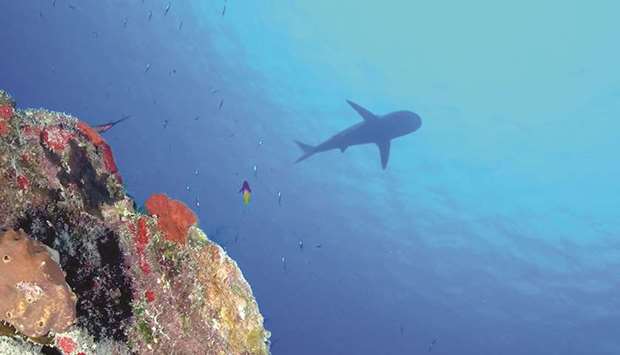There are no borders that separate the water, reefs and marine life off the coasts of Cuba and Florida, and that’s why scientists in both countries say they need to get along and collaborate.
During the recent MarCuba conference in Havana, US scientific institutions were well represented and researchers also used the conference to highlight research collaborations and a milestone edition of the Bulletin of Marine Science, a respected marine science journal published by the University of Miami’s Rosenstiel School of Marine and Atmospheric Science.
The Bulletin devoted its entire spring issue to marine science research in Cuba, carried out by US and Cuban scientists.
“Science plays an excellent role in diplomacy,” said Joe Roman, a conservation biologist at the University of Vermont and the guest editor of the special Cuba edition. What better area for collaboration than one with shared ocean systems, fisheries and conservation efforts, he said.
In a Bulletin editorial, Roman wrote that the Cuba edition “celebrates Cuban marine science and conservation efforts, while recognising that improved relations and increased tourism and trade could put some natural areas at risk. Joint research shows promise that Cuba, the US, and other countries can work together on regional conservation efforts.”
“It’s time for Cuban researchers to reach a wider audience,” Roman said.
“This research 90 miles to the south is relevant to Florida’s ecosystems too; we’re connected,” said Dan Whittle, an attorney who heads the Cuba programme at the Environmental Defense Fund.
Among the topics the papers explore are: how fishing, pollution and climate change have affected the coral reefs off Havana; conservation of marine turtles and manatees, marine protected areas in Cuba, commercial fisheries in Cuba, the movements of female silky sharks, and how Cuban land use and conservation efforts have affected coral reefs.
By necessity, because fertilisers and other chemicals haven’t been readily available, agricultural has become more organic in Cuba. That means less chemical runoff and “this has had a good effect on the coral reef,” said Roman.
Cuban corals also seem to be more resilient to warming waters than those off the Florida coast.
One of the highlights of the Cuban edition was a Cuban fisheries report that used new scientific tools that allow access to fish populations when not much data is available. “The authors reached the conclusion that a number of species are highly susceptible to over fishing,” said Whittle.
The recent Cuba edition of the Bulletin of Marine Science was historic because for years the journal’s editors believed the embargo prevented them from publishing the research papers of Cuban scientists.
After the 1996 Helms-Burton Act strengthened the embargo, the university’s general counsel deferred to an interpretation by Treasury’s Office of Foreign Assets Control that scholarly publication of work by authors from sanctioned nations, including Cuba, was prohibited, said Geoffrey S. Shideler, assistant editor of the Bulletin of Marine Science.
The hang-up was that the editing and other services associated with getting an article by a Cuban researcher ready for a peer-reviewed publication could be interpreted as adding value or an economic benefit to the work, potentially run afoul of the embargo, Whittle said.
Eventually, he said, the regulations were changed so that such peer-reviewed publications were permitted, provided that those producing the content were not Cuban government officials. In Cuba, that’s a hazy area because pretty much everyone, except self-employed workers, are on government employment rolls.
“Some American journals chose to ignore that (restriction) and published Cuban research. Others did not and interpreted the regulation quite conservatively,” Whittle said.
That was the case with the Bulletin of Marine Science, which began publishing in 1951 as the Bulletin of Marine Science of the Gulf and Caribbean. “It was unclear for many years,” Shideler said.
In 2014, while working with students in Cuba, Roman said he was surprised to learn that Patricia Gonzalez-Diaz, a Cuban colleague who is now director of the Center for Marine Research at the University of Havana, had submitted a paper to the Bulletin and it had been rejected without any review.
“I had no idea that there would be a problem with Cuban papers,” he said. That prompted Roman and some of his scientific colleagues to begin looking over the US regulations. “We discovered there was an exemption in the regulations” for academics and academic papers, he said.
A guidance published by the US Office of Foreign Assets Control in October 2016 finally made that clear. It said that participating or collaborating with a US publishing project is fine as long as an individual is “not acting on behalf of the Cuban government” and is “publishing in his or her personal capacity.”
Furthermore, it said “collaborating on the creation and enhancement of written publications” and the “substantive editing of written publications” is permitted.
Many journals hadn’t noticed that clarification, said Roman. “When we approached the editor of the Bulletin of Marine Science, he passed the information on to the general counsel and very quickly the policy was overturned,” he said.
Not only did the Bulletin editors agree to consider publishing research by Cuban scientists but they decided to bring out the special Cuba edition with Roman and Gonzalez-Diaz serving as guest editors.
Publishing the special Cuba edition was something of a return to the Bulletin’s roots. In its early years marine research from Cuba had been part of the journal and a researcher from Cuba sat on the first editorial board, said Shideler.
“With the publication of this special issue, we look forward to receiving high-quality publications from researchers in the region” and from all over the globe, he said.
Many of the authors who contributed to the Bulletin of Marine Science were at last month’s MarCuba conference, and there was a panel on US-Cuba research co-operation and presentations on three different Cuba-US marine research expeditions in Cuban waters over the 18 months.
“It was a way to celebrate the end of the academic embargo,” Whittle said. —Miami Herald/TNS

AZURE WATERS: A marine protected area in Cuba.
